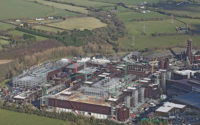Intel Corp. formally broke ground Sept. 9 on a $20-billion project to build two semiconductor chip manufacturing plants in central Ohio. Company leaders and government officials praised the project as an example of investments to boost domestic chip production after decades of U.S. market share declines.
The project will support about 7,000 construction jobs, said Keyvan Esfarjani, Intel’s senior vice president and general manager of manufacturing, supply chain and operations. In addition to work on the New Albany, Ohio, site itself, the project has already spurred “significant infrastructure” work in the surrounding area, he added.
The two fabs under construction "are going to require [as much] concrete [as] building two of the world’s tallest buildings ... and enough structural steel to build eight Eiffel Towers,” Esfarjani said.
Early excavation work began earlier this summer, with a team led by Gilbane Building Co. The team also includes McDaniel’s Construction Corp., Northstar Contracting Inc. and GTSA Construction Consulting.
Intel says the 1,000-acre “mega-site” northeast of Columbus has room for as many as eight plants, known as “fabs.” The company estimates it would require a $100-billion investment to fully build and equip those plants.
President Joe Biden and various lawmakers attended Intel’s groundbreaking ceremony. In August, Biden signed the Chips and Science Act, which includes about $39 billion to support chip plant construction. He touted Intel’s project as one of many that would help increase U.S.-based production of semiconductor chips, which are used in a wide variety of goods. He noted that the U.S. share of chip production has slipped from more than 30% in the early 1990s to about 12%, according to the Semiconductor Industry Association.
“As we saw during the pandemic, when factories that make these chips shut down, the global economy comes to a halt, driving up costs for families and everyone, not just here, but around the world,” Biden said.
Intel is not alone in moving to boost domestic semiconductor chip production. Micron Technology Inc. recently announced it would invest $15 billion building a fab in Boise, Idaho, as part of plans to invest $40 billion in manufacturing expansions. GlobalFoundries and Qualcomm extended a long-term semiconductor manufacturing agreement that will keep production in the U.S. that may have otherwise moved overseas. And on the same day as Intel’s groundbreaking, Wolfspeed Inc. selected a site in Chatham County, N.C., to build a $5-billion materials manufacturing facility to produce silicon carbide wafers for semiconductor chips.






Post a comment to this article
Report Abusive Comment